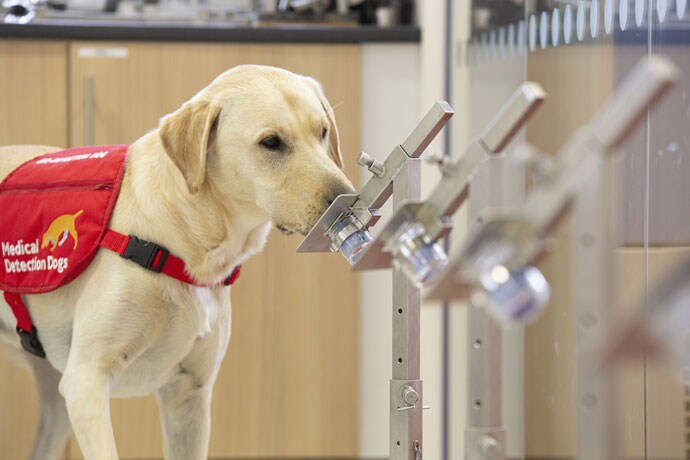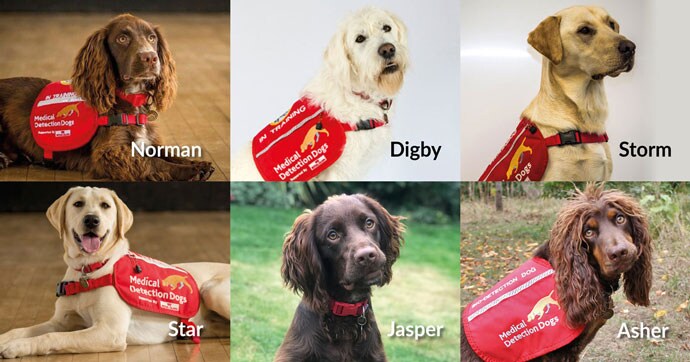Trials are due to start shortly in the UK to investigate whether specialist medical sniffer dogs could detect COVID-19 in humans, even before symptoms appear.
Dogs have previously been trained by Medical Detection Dogs to use their strong sense of smell to detect distinctive odours linked to some cancers, malaria, and Parkinson's disease.
The charity will work with the London School of Hygiene & Tropical Medicine (LSHTM) and Durham University on the first phase of the trial once ethical approval is granted. Confirmation is expected in the next few days.

Government Funding
The Department of Health and Social Care announced on Saturday it was awarding the project a grant of £500,000.
Lord Bethell, Minister for Innovation, said: "Accuracy is essential, so this trial will tell us whether 'COVID dogs' can reliably detect the virus and stop it spreading."
If successful, the proof-of-principle trials could lead to a group of six novice bio-detection dogs entering several weeks of specialist training.
Norman, Digby, Storm, Star, Jasper, and Asher, are a mix of spaniels and Labradors, half of which came from rescue charities.

The initial phase of the trial will see NHS staff in London hospitals collect odour samples from people who are infected with coronavirus and those who are uninfected. The dogs will then be tested to see whether they can identify the presence of SARS-CoV-2 from the samples.
The study is led by Prof James Logan, head of the Department of Disease Control at the LSHTM, who said: "Our previous work has shown that malaria has a distinctive odour, and with Medical Detection Dogs, we successfully trained dogs to accurately detect malaria.
"This, combined with the knowledge that respiratory disease can change body odour, makes us hopeful that the dogs can also detect COVID-19."
Professor Karol Sikora, medical director of Rutherford Health, and dean of the University of Buckingham's medical school, who also comments on cancer issues for Medscape UK, said on Twitter: "Properly trained sniffer dogs could revolutionise our approach to this whole pandemic, screening 250 people an hour for the virus."
Medscape News UK spoke to Dr Claire Guest, co-founder and CEO of Medical Detection Dogs to find out more.
Q&A
We want to do this work very robustly and produce a good evidence base that can support this work both for the potential for dogs working in the UK but also around the world.
So, with all this sort of work you have to go through the process of getting ethics approval for your study. We have a collaboration with the London School of Hygiene & Tropical Medicine and Durham University, and we've been working together to get the paperwork done and also to find a safe way of collecting the samples and presenting them to the dogs.
We are also of course looking for funding, which is very important, as we are a small charity.
We have got enough initial funding to go to the first phase which is to collect samples and have them processed at the London School and brought to the centre in order that we can train the first dogs to see whether there is an odour associated with COVID-19.
Is it right to say that at this stage, you don't yet know if that's the case?
No, we don't know for sure.
All the dogs are at the centre in the day. We have a 'no kennel' policy, so all our dogs live out with volunteers and go home in the evenings to put their feet up, but they come in in the day at the moment. They're doing all their comparatory training, so they're learning all rules of the 'scent game' – learning to use their nose, learning how to indicate – but we still don't know whether COVID-19 does have an odour.
You have experience with dogs detecting diseases like cancer and Parkinson's, and with bacteria. But have you had previous experience in dogs being able to detect viruses as well?
This will be the first time that the charity's worked on a virus.
We've worked in a number of other diseases, some of which are incredibly difficult to diagnose. Parkinson's disease, for example. There is no test for Parkinson's disease other than waiting for the damage to show itself and for an assessment to be made symptomatically. We discovered that Parkinson's disease had a very unique odour that dogs were able to detect really reliably.
We've also worked over the last couple of years by looking at Pseudomonas, and this is of particular interest because although it is a bacterium, the effect it has on the lungs of people who are vulnerable – that might be people who are immunocompromised, people for example with cystic fibrosis – is that it does a lot of damage and can be severely life-threatening for these individuals.
There's also evidence from the world of chemistry, looking at mass spectrometry, that other viruses do seem to have unique odour patterns.
There was a paper published a few years ago [Real-Time Detection of a Virus Using Detection Dogs] on training dogs to be able to detect viruses in cattle, which was very successful.
So, we have every reason to believe this will be very possible. And of course we're not detecting the virus itself, in as much as virus specific cell culture, but detecting the effect of COVID-19 on an individual. So, I'm sure that there will be an odour associated.
If there is an odour associated with COVID-19, how long will it take to train these dogs to detect it?
The first 2 or 3 weeks that we have the samples on site, we'll be doing a rough and ready look to see if some of our more experienced dogs can tell us whether they are detecting a difference. Once we've got that we'll move into the second part which will be training a team of dogs, which will be some young, novice dogs, over hundreds of samples.
Some of these samples, as the training progresses, will be samples where everybody doing the training at the centre won't know whether they're positive or negative until the dogs give notification.
What that enables us to do is build up a big evidence base of sensitivity and specificity.
That period of time takes up to 10 weeks, from start to finish, to develop robust data.
And then of course they'll be moving from samples that are collected to detection on people, which ultimately I'm sure will be more straightforward because if you think of a dog being trained on a small sock piece, which is what we train them on, the amount of odour that's coming off someone if you screen them in real life would be, I'm sure, much bigger than the odour that comes off a tiny piece of sock.
So, this early training is really going to show us how valuable this work is.
How and where do you see these dogs being deployed?
The first sort of model we would see would be working in transport hubs – if things move on and people start to move around a bit more, and more people have to fly.
What we'd be doing is using intelligence, as flights come in from areas where there are hot-spots.
Just as dogs currently work in airports with currency, explosives, drugs, as you come in through passport control, a dog sniffs you for point-five of a second. You don't have to stop moving, the dog sniffs the air around you.
This of course would be of huge value in being able to rapidly screen a group coming in from an area of the world where there may be a current hotspot, and ensuring that those persons take the test immediately and isolate for periods as required. I could see there may be other applications where dogs working in this way will be of huge value.
Of course it's not about dogs working instead of using tests, it's dogs working to assist with the current testing. So, in order to make quick decisions about people who need to get tested immediately.
The important thing is of course as well is that we have good reasons to believe that if dogs can detect COVID-19, that they will be able to detect it in the asymptomatic/pre-symptomatic phases.
The relevance of this is that if somebody's trying to get on the plane with a fever and a cough, almost certainly they wouldn't be allowed to fly, but if [during] those 5 days when people are shedding and spreading before they may have symptoms...if dogs can pick these people out, it's going to have a real impact.




